Introduction
Forensic accounting is a crucial field that merges accounting, auditing, and investigation to scrutinize financial discrepancies and fraud. With the rise of complex cases involving cryptocurrencies and advanced fraud techniques, forensic experts are employing advanced tools like Chainalysis to navigate through intricate blockchain transactions and uncover fraudulent activities. In this ever-evolving landscape, forensic accountants play a vital role in detecting and preventing fraud, analyzing financial records, gathering evidence, providing expert testimony, and designing anti-fraud controls.
Their expertise is essential in various specialized areas such as insurance claims, bankruptcy cases, money laundering investigations, and business valuations. Upholding the principles of objectivity, expertise, confidentiality, integrity, and independence, forensic accountants ensure the credibility of their analyses and contribute to the integrity of financial systems. As financial fraud becomes increasingly intricate, forensic accountants employ a multi-faceted toolkit, including data analysis, financial statement analysis, interviews, forensic technology, and document examination, to uncover fraudulent activities and protect financial interests.
By upholding ethical standards, collaborating with legal teams, and shaping industry standards, forensic accountants foster trust, enhance the integrity of financial processes, and play a vital role in the pursuit of justice. As the field continues to evolve, forensic accountants are adapting to new challenges, such as cybercrime investigations, the use of data analytics and artificial intelligence, international collaboration, and continuous learning, to stay ahead of emerging fraud trends and safeguard financial systems effectively.
What is Forensic Accounting?
Forensic accounting combines the knowledge of accounting, auditing, and investigation to examine discrepancies and fraud. This crucial field employs accounting methodologies to probe irregularities, spot potential deceit, and deliver decisive evidence in legal settings. Forensic accountants are the linchpins in exposing monetary misconduct and supporting legal actions. Their work has never been more relevant, as seen in the complex cases involving cryptocurrencies, where transparency and record-keeping practices often fall short. With advanced tools like Chainalysis, forensic experts can now navigate through intricate blockchain transactions with verifiable data, bolstering their investigations.
The changing landscape of monetary deception presents noteworthy obstacles, as scammers exploit advanced schemes and extensive systemic knowledge to hide their activities within authentic monetary procedures. It's a daunting task for experts in finance to detect such schemes amidst the massive volumes of complex data. However, leveraging technology such as data analytics has become increasingly pivotal in identifying fraudulent activities. Modern forensic accounting embraces these tools to overcome human limitations and traditional methods that are no longer sufficient against advanced fraud techniques.
Understanding the interaction between monetary documents is essential. As Tan & Robinson emphasize, illicit monetary maneuvers can span across multiple statements, affecting everything from net profit to retained earnings. Robust scrutiny of all financial records is imperative to grasp a firm's condition and to detect any manipulative practices. The insights from 'Asian Financial Statement Analysis' emphasize the importance of vigilance and expertise in recognizing wrongdoing, particularly within the dynamic Asian markets.
In the battle against occupational deception, the importance of strong anti-deception measures cannot be emphasized enough. The Report to the Nations highlights that more than half of occupational dishonesty arises from insufficient internal controls or their deliberate circumvention. As financial investigators strengthen their resources with sophisticated identification techniques and data analysis, they stay resolute in their dedication to uncovering deception and strengthening safeguards against it, guaranteeing a heritage of comprehension and watchfulness.
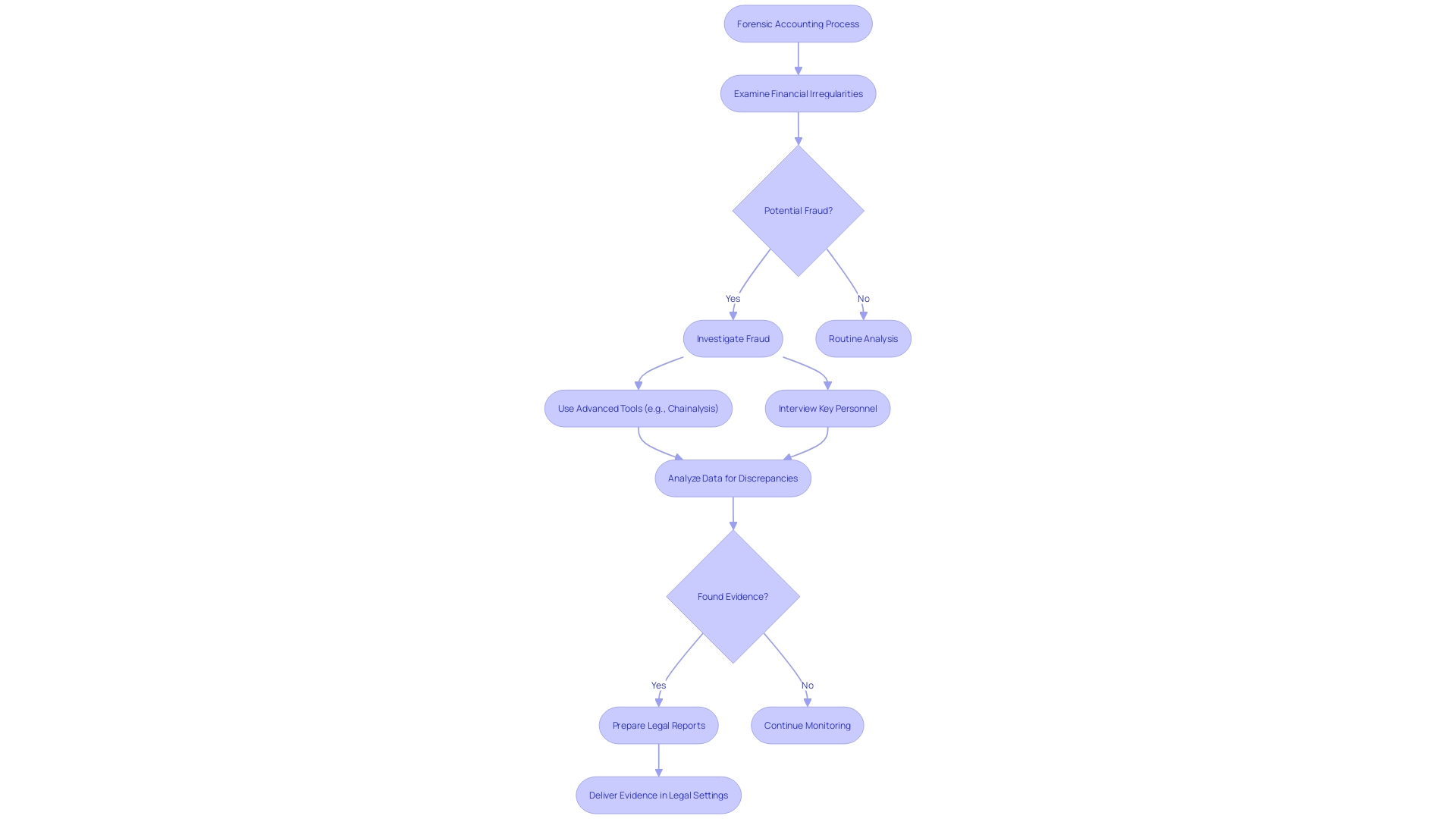
Key Principles of Forensic Accounting
Forensic accounting principles are vital for navigating complex economic landscapes and ensuring the accuracy of monetary information. Impartiality is crucial, as financial investigators must approach their analyses without prejudice, ensuring that their conclusions are based solely on the evidence presented. This neutrality becomes particularly important in intricate scenarios involving sophisticated instruments, such as cryptocurrencies, where transparency may be minimal.
Expertise in the field is non-negotiable. The ability of an expert in analyzing monetary information and detecting irregularities is a result of vast expertise and experience. This proficiency allows them to unravel complex schemes that can be deeply embedded within an organization's financial systems, as highlighted by the increasing sophistication of financial statement fraud.
Ensuring the secure management of information is a duty that financial investigators carry, as the delicate character of their work can have significant consequences on the reputations and activities of the organizations concerned. This was exemplified in the case of De Grandpre Chait, where the utilization of specialized software like Chainalysis was instrumental in managing confidential data with the necessary care.
Furthermore, integrity is the foundation of a financial investigator's ethical position. Their commitment to ethical conduct ensures that their work withstands scrutiny, a principle that resonates with the mission of the IFRS Foundation to instill trust and inform investment decisions through high-quality accounting standards.
Finally, independence is crucial to the credibility of a financial investigator's findings. An autonomous stance safeguards against undue influence, ensuring the veracity of their analyses. For example, the thorough testimony provided by forensic experts in legal proceedings, as observed in the New York civil trial involving Donald Trump's organization, highlights the significance of an independent and systematic approach to presenting monetary evidence.
These principles not only guide the profession but also set the stage for the trustworthy and ethical unraveling of monetary intricacies, playing a pivotal role in maintaining the integrity of fiscal systems and fostering trust within the economic landscape.
The Role of Forensic Accountants
Forensic experts play a vital role in uncovering intricate economic offenses, offering a diverse strategy to both identifying and stopping deceit. Their skills are put to use in:
-
Fraud Detection: Applying their specialized knowledge, forensic accountants scrutinize financial records for irregularities that may signal deceitful activities. Their analytical prowess is crucial in pinpointing unusual patterns that could elude the untrained eye.
-
Analysis: Thoroughly examining statements and records, these professionals reveal inconsistencies or concealed assets. Their examinations are essential for unearthing evidence of monetary manipulation.
-
Gathering of Proof: Collecting a strong range of monetary evidence, from statements from banks to electronic data, specialized investigators accumulate the information required for legal proceedings, guaranteeing that the proof can endure examination in the courtroom.
-
Expert Testimony: In court, they distill complex economic data into understandable insights, aiding judges and jurors in grasping the intricacies of the case.
-
Fraud Prevention: Beyond reactive measures, forensic accountants actively design and implement systems to thwart fraudulent behavior. They evaluate risks and improve financial procedures to strengthen an organization's defenses against deceptive activities.
The need for such expertise is emphasized by the changing nature of deception, as demonstrated by cases handled by specialized law firms such as De Grandpre Chait. Addressing cryptocurrency-related misconduct, where conventional methods struggle due to unclear transactions and limited records, they utilized Chainalysis software to enhance their investigative capabilities.
The work of Dr. Weber exemplifies the field's impact. As an educator and expert in deception, he utilizes his extensive background to enlighten students and professionals alike. His investigation illuminates the reasons behind monetary misconduct, and by means of the experiential program on deceit, he prepares his students to tackle exploitation and high-tech crimes in marginalized communities.
Staying ahead of fraud trends is crucial, as highlighted by the Identity and Fraud Report, which reveals significant consumer and business concerns over online security and fraud risk. Economic instability often leads to a surge in fraudulent activity, with perpetrators exploiting periods of stress.
In this challenging landscape, forensic accountants are an organization's first line of defense, investigating discrepancies, suspicions of malfeasance, or exposure to improper conduct by external parties. Their priceless contributions are shown by their role in detecting and addressing illicit activities, as observed in Alaska's dedicated efforts to combat deceit, boasting the third-highest rate of fraudulent activities in the United States.
Methods and Techniques in Forensic Accounting
Forensic accounting is an investigative branch of accounting that examines records in search of fraudulent activity. To navigate the intricate terrain shaped by progressively advanced deceitful schemes, forensic accountants utilize a diverse set of tools for analyzing monetary data.
- Data analysis is pivotal, with cutting-edge software being utilized to detect irregularities within vast amounts of data. This approach is crucial given the complex nature of modern economic systems, which can be laden with intricate transactions and elaborate accounting methods.
- Financial statement analysis is another cornerstone, focusing on balance sheets and income statements to uncover any signs of manipulation that could indicate fraud. This method is continually challenged by fraudsters’ deep understanding of internal controls and operations, necessitating advanced analytical tools. In-person interviews and interrogations are conducted to extract information, identify discrepancies, and evaluate the credibility of those involved in monetary transactions.
- Forensic technology, such as computer forensics and data recovery, plays a critical role in extracting electronic evidence from digital devices, an area that has become increasingly relevant as fraudsters move towards high-tech methodologies. Finally, document examination is used to scrutinize documents for any evidence of tampering, such as forged signatures or altered records.
These methods are carefully chosen and applied based on the direction of the investigation and the hypotheses being tested. Through a rigorous process of data collection, analysis, and synthesis, forensic accountants draw conclusions to assist in the prevention and prosecution of misconduct. This task not only demands technical knowledge but also a comprehension of the psychology behind monetary deception, as individuals often rationalize their behavior within a intricate network of justification. Ultimately, the objective is to improve the credibility of processes and safeguard against the abuse of weaknesses within monetary systems.
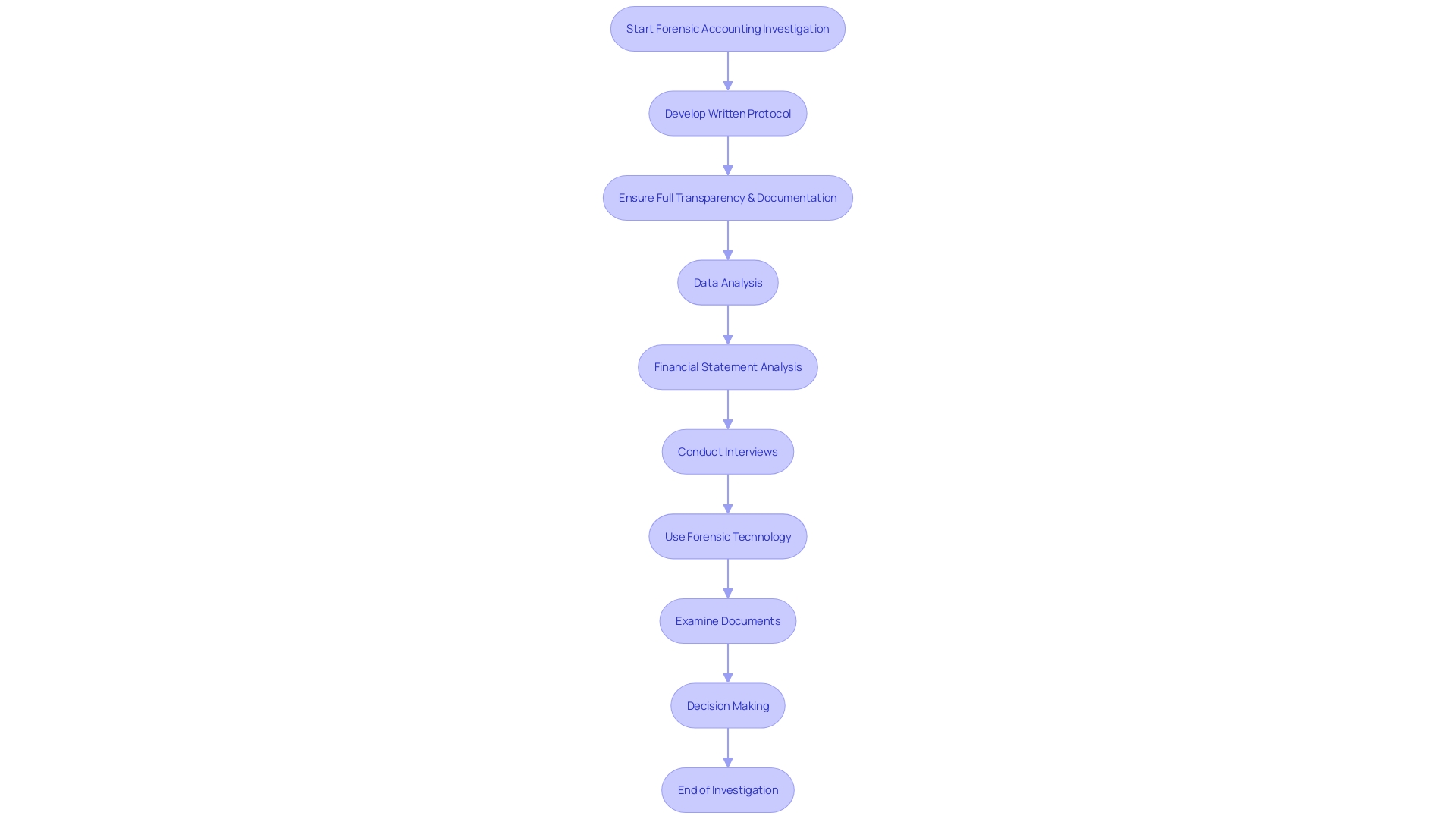
Fraud Examination and Investigation
Forensic accounting plays a crucial role in the detection and investigation of fraud. At the core of this field is the careful examination of records to identify suspicious activity. This includes spotting red flags such as sudden changes in monetary patterns, transactions without logical explanations, or peculiar entries in the accounting records. To construct a case, professionals in financial investigation employ a systematic approach to gathering evidence, utilizing financial examination, document analysis, advanced data analysis, and interviews with individuals connected to the issue at hand.
Compiling their findings into comprehensive reports, financial examiners create a documented trail that is critical in legal contexts. Their collaboration with legal teams is essential, as they work to ensure that the evidence they've gathered is permissible in court and that their expert testimony is poised to have a significant impact. Beyond the courtroom, forensic accountants are also instrumental in the recovery of assets. They trace and identify assets that have been misappropriated, aiding in their seizure and the subsequent restitution of funds to the rightful owners.
Given the significant danger that occupational deception poses to organizations, it is crucial to implement strong anti-deception measures. The 2024 Report to the Nations highlights this, revealing that more than half of occupational deceits are the consequence of insufficient internal controls or the intentional circumvention of said controls. Furthermore, the report highlights the evolving profile of a fraudster and showcases how technological advancements, particularly in data analytics, are increasingly integral to unearthing fraudulent activities.
In this constantly evolving environment, the knowledge offered by the Report to the Nations, coupled with the most recent statistical information on detection and prevention of deception, are priceless resources for accountants specializing in investigations. These resources help in keeping up with the latest trends and methods in the fight against fraud, ensuring that forensic accounting stays at the forefront of safeguarding the interests of organizations and, by extension, the EU's budget as managed by Member States, which represents over 85 percent of expenditure.
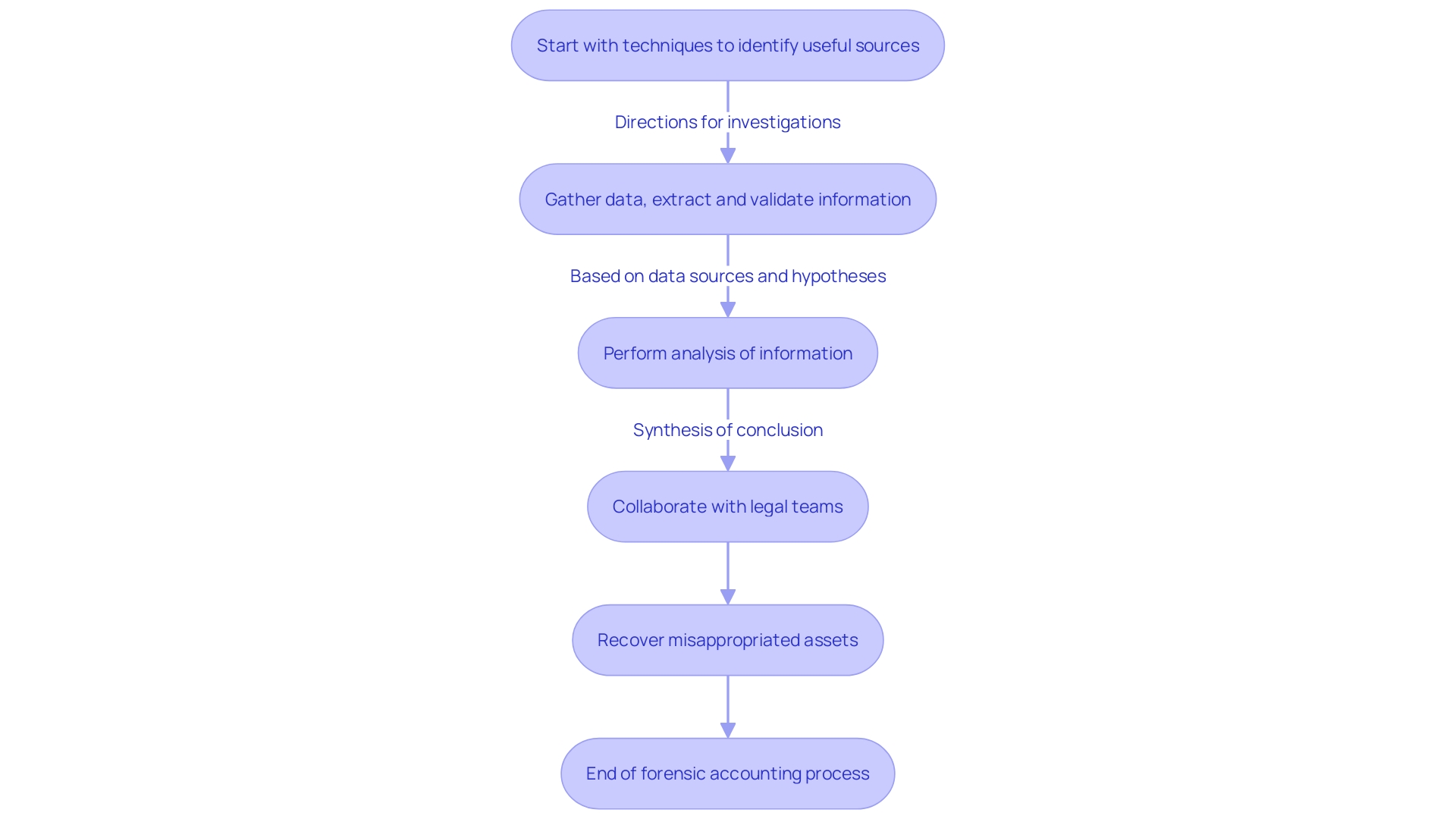
Specialized Areas in Forensic Accounting
Forensic accounting stands at the forefront of monetary vigilance, providing a critical service across a spectrum of specialized areas. In the realm of insurance claims, these detectives offer indispensable support to companies by scrutinizing and unpicking claims, spotlighting fraudulent activity, and confirming losses. In bankruptcy and insolvency cases, their analytical expertise comes to the forefront, sifting through records to detect suspicious transactions and trace assets, all in the service of maximizing returns for creditors.
The fight against money laundering involves financial investigators joining forces with law enforcement, utilizing their expertise to track the flow of money, identify the sources of illegal funds, and provide solid evidence for legal actions. When matrimonial disputes arise, these professionals delve into financial details, assessing assets, and ensuring a fair division of marital property.
In the corporate world, the contribution made by financial investigators is equally important. Their expertise in business valuation is sought in various scenarios, including conflict resolution, mergers and acquisitions, and shareholder disagreements. Their assessments often become the cornerstone for informed decision-making in these high-stakes situations.
Forensic financial experts also have a crucial part in fighting hidden dangers, like elder financial deception, a rising worry with mean damages per victim exceeding $18,000. They are at the vanguard of developing strategies to thwart such crimes before they occur, including educational initiatives aimed at empowering vulnerable populations and their families with knowledge and tools to defend against scams.
Recent advancements in technology, especially in the realm of cryptocurrencies, have posed new challenges that require modern solutions like Chainalysis. This software not only meets the high demands for data quality and reliability but also provides a user-friendly platform that can easily adapt to the complex transactions associated with digital currencies.
Given the increasing intricacy of statement fraud, professionals specializing in analyzing data are indispensable when it comes to unraveling concealed schemes in the extensive and intricate reporting landscape. Their contributions are crucial in a world where the traditional methods of analysis are outmatched by the sheer volume and sophistication of economic data.
As organizations keep evolving, the responsibility of accountants specializing in investigation will only increase in significance, guaranteeing transparency and integrity within the monetary realm. Their thorough investigations, skilled valuations, and preventive measures create a stronghold against malfeasance, protecting assets and upholding trust in the monetary system.
The Importance of Objectivity and Ethics in Forensic Accounting
In the intricate field of forensic accounting, the pillars of objectivity and ethics stand at the forefront, underpinning the credibility of every investigation. Forensic accountants are tasked with navigating through discrepancies in finances, suspicions of malfeasance, and the potential misconduct of various external parties. Their role transcends mere number-crunching; they are the sentinels of financial integrity, often called upon to dissect complex monetary puzzles where the lines between legal disputes and ethical dilemmas blur.
Guided by an unyielding commitment to ethical principles, these professionals delve into the facts, free from bias, to ensure that their analysis withstands the rigors of legal scrutiny. Such steadfast adherence to ethical standards is not merely about maintaining the reputation of the profession; it's about fostering a deep-seated trust with clients and stakeholders alike. This trust is the foundation on which the validity of their expert testimony is constructed, often influencing judicial outcomes where evidence is crucial.
Forensic accountants also embody a commitment to upholding and shaping industry standards. These standards, which include rigorous specifications for procedures ranging from DNA analysis to medicolegal death investigations, are crafted through collaborative processes that welcome diverse inputs. The significant establishment of such standards is vital in strengthening the disciplines within the science of investigation and in expressing its importance to the legal arena. They bring methodological transparency and help demystify complex legal issues for jurors, who otherwise may overestimate their understanding of the evidence presented.
The influence of accounting for legal investigation is substantial and extensive, as demonstrated by experts in the area such as Dr. Weber. His work not only advances academic thought but also directly contributes to the practical world, where his students aid in the investigation and prosecution of monetary crimes. By providing grants to support experiential programs focused on fraud, these future forensic professionals are trained to tackle challenges like exploitation of the elderly in rural areas and high-tech crime.
Forensic accountants serve as the protectors of truth in matters of finance, where objectivity and ethics are not only ideals but the fundamental core of their professional existence. Their work, supported by clearly defined standards and ethical rigor, remains crucial in the pursuit of justice within the monetary landscape.
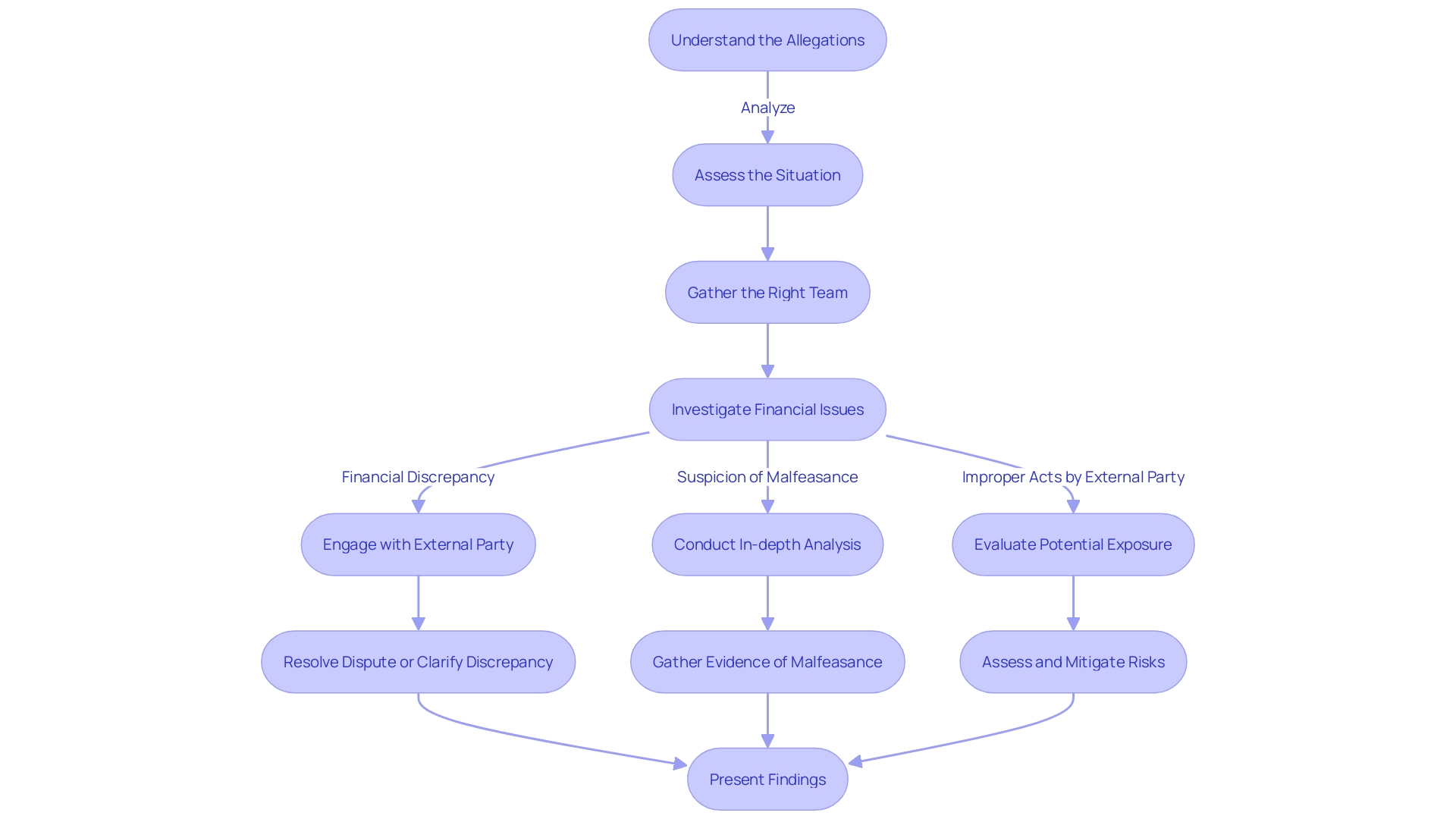
Real-World Applications and Case Studies
Forensic accounting is a critical field that intersects with various sectors to address and resolve monetary complexities and irregularities.
- In the business domain, investigative auditors are the detectives who uncover statement manipulation, corruption, and misappropriation of funds. Their knowledge has become indispensable as deception schemes evolve in sophistication, often meticulously hidden within seemingly ordinary monetary processes. The complex dance of digits in financial data, where anomalies reveal the secrets of misconduct, is where accountants specializing in investigation shine, utilizing advanced tools and techniques, such as Benford's Law, to detect irregularities that traditional methods may miss.
Government agencies also benefit from investigative accounting, utilizing these skills to uncover tax evasion and fraudulent procurement. The challenge of corruption is met with the meticulous analysis and investigation of forensic experts, who sift through complex data to protect the public interest.
- Non-profit organizations, driven by missions rather than profits, confront unique vulnerabilities to fraud. Forensic financial experts serve as guardians, ensuring that philanthropic funds are channeled as intended, safeguarding the trust and resources of donors and beneficiaries alike.
Within the insurance sector, experts in financial investigation play a crucial role in uncovering deceitful claims and assessing the extent of losses. Their role is a keystone in the arch of trust between insurers and the insured, preventing the economic strain caused by insurance fraud.
The legal field frequently relies on the expertise of financial investigators to offer essential assistance. They examine monetary information and compute losses, assisting in the settlement of monetary conflicts. Their expertise has been sought in high-profile cases, such as the trial involving Donald Trump's top accounting specialist, where the forensic specialist's testimony was a focal point in understanding intricate monetary transactions.
Forensic accountants are the monetary firefighters in industries rife with fiscal challenges, from professional sports to high-stakes legal battles. Their role is becoming increasingly vital in a world where economic data grows exponentially in volume and complexity, requiring a blend of detective work and monetary acumen to ensure integrity and justice in economic matters.
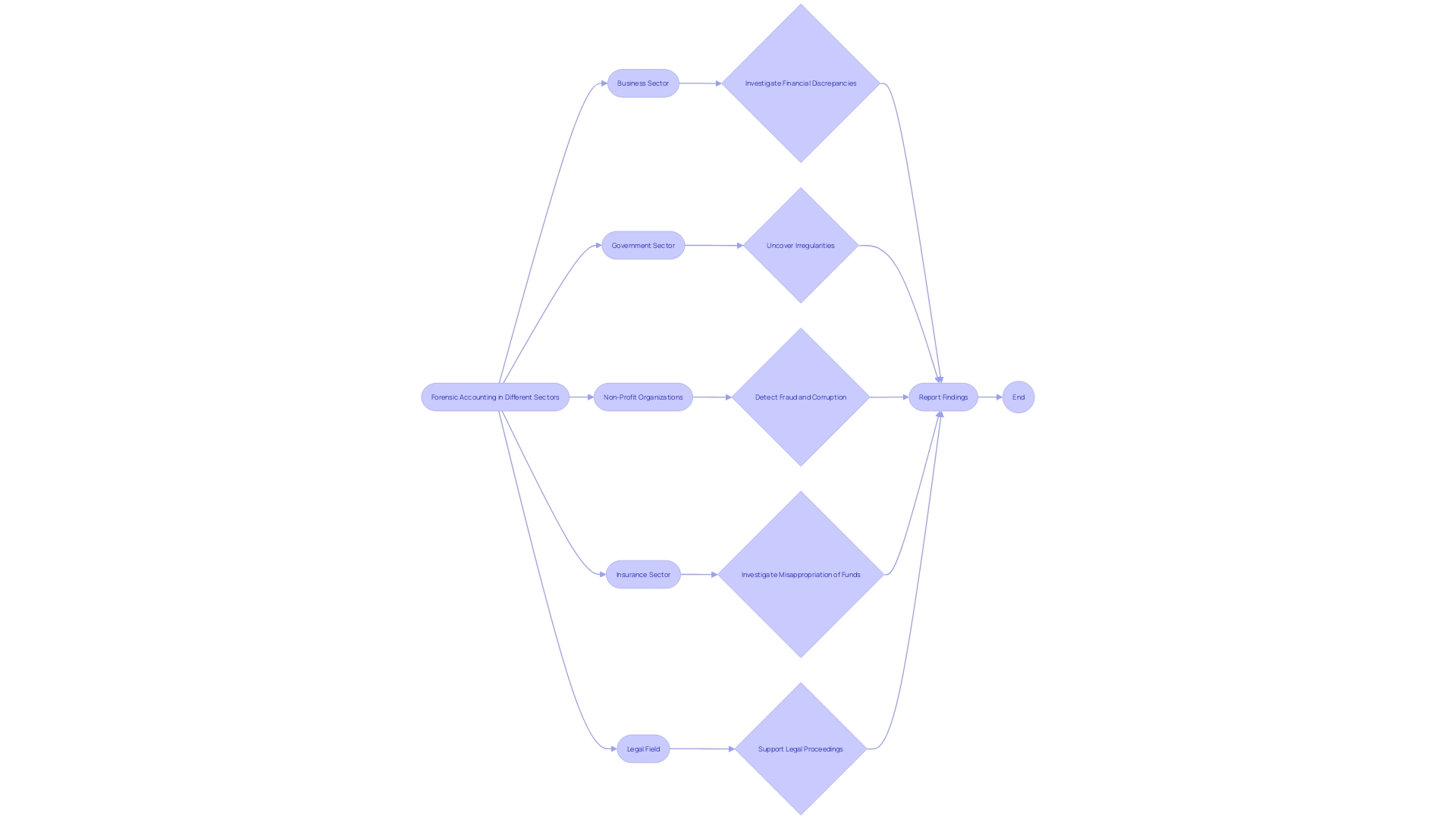
The Future of Forensic Accounting
The field of accounting specialized in investigating crimes related to finances is evolving quickly in response to the complexity of these offenses. Key future developments include:
-
Cybercrime Investigations: The digital era has given rise to new forms of misconduct, necessitating forensic accountants to become adept in scrutinizing illicit activities on digital platforms. For example, companies such as De Grandpré Chait utilized specialized software like Chainalysis for complex cryptocurrency transactions, emphasizing the necessity of technological competence in tracking and analyzing digital crimes.
-
Data Analytics: Advanced data analytics have become pivotal in unearthing financial deceptions. The high data quality and reliability of tools like those provided by Chainalysis facilitate a more streamlined process, enabling accountants specializing in financial investigations to detect fraud with greater precision.
-
Artificial Intelligence (AI): The integration of AI in accounting investigation is poised to revolutionize the field. AI can automate repetitive tasks such as data analysis and document review, enhancing efficiency and allowing experts to focus on more complex aspects of financial investigations.
-
International Collaboration: Financial crimes often have a global footprint, necessitating cross-border collaboration. The knowledge of forensic financial professionals like Jason Flemmons at Ankura is crucial in navigating international cases, as demonstrated during his testimony in high-profile legal proceedings.
-
Continuous Learning: The finance sector's landscape is ever-changing, as underscored by the tumultuous events of the 2020s and the surge in remote work. Forensic financial professionals must dedicate themselves to continuous learning in order to stay updated on emerging trends, technological advancements, and regulatory changes to preserve their effectiveness in detecting and preventing financial misconduct.
These trends are not just predictions; they are already taking shape as schemes of deceit grow in complexity, overwhelming traditional analysis methods. With businesses generating vast amounts of financial data, it is imperative for forensic accountants to leverage the latest tools and collaborate internationally to combat fraud effectively.
Conclusion
In conclusion, forensic accountants play a vital role in detecting and preventing fraud, analyzing financial records, gathering evidence, and designing anti-fraud controls. They employ a multi-faceted toolkit, including data analysis, financial statement analysis, interviews, forensic technology, and document examination, to uncover fraudulent activities and protect financial interests.
The key principles of forensic accounting, including objectivity, expertise, confidentiality, integrity, and independence, ensure the credibility of their analyses and contribute to the integrity of financial systems. Forensic accountants collaborate with legal teams, uphold ethical standards, and shape industry standards to foster trust and enhance the integrity of financial processes.
Their work has real-world applications in various sectors, including corporate, government, non-profit organizations, insurance, and litigation. Forensic accountants contribute to resolving financial complexities and irregularities, protecting the public interest, and ensuring trust in financial systems.
The future of forensic accounting is evolving in response to the sophistication of financial crimes. Key developments include cybercrime investigations, data analytics, artificial intelligence, international collaboration, and continuous learning. Forensic accountants must adapt to new challenges, leverage advanced tools and technology, collaborate internationally, and commit to ongoing education to effectively combat fraud in the ever-changing financial landscape.




